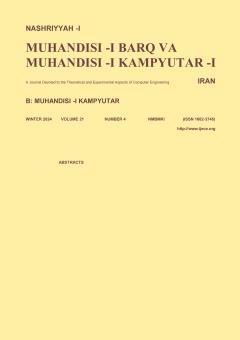بهینهسازی حالتهای اولیه برای رایانش کوانتومی آدیاباتیک در یک الگوریتم کوانتومی
الموضوعات : electrical and computer engineering
1 - دانشكده مهندسي برق، دانشگاه تفرش
2 - گروه فیزیک، دانشگاه تفرش
الکلمات المفتاحية: الگوریتم دش, رایانش کوانتومی آدیاباتیک, رایانش کوانتومی,
ملخص المقالة :
در هر رایانش کوانتمی آدیاباتیک، یک حالت اولیه وجود دارد که در الگوریتم کوانتومی مربوط استفاده میشود. در این مقاله، رابطه بین یک حالت اولیه و ترازهای انرژی مجاز در یک الگوریتم تعمیمیافته دش پیادهسازیشده مطالعه گردیده است. برای مطالعه الگوریتم تعمیمیافته دش، یک فرم فشرده برای حالتهای خروجی بهدست آمده است. نشان داده میشود که میتوان حالت اولیه را طوری فراهم کرد که کمینههای انرژی را کنترل نمود. با استفاده از روشهای عددی، کمینه انرژی حالتهای مجاز برای حالت اولیه بهدست آورده شده و برای بررسی دینامیک سامانه، حالت اولیه بهدستآمده انتخاب گردیده است. هامیلتونی مربوط به الگوریتم، بهدست آورده شد و مشخص گردید که یکی از ترازهای انرژی یک حالت مقید را توصیف میکند.
[1] IBM, IBM Quantum Computing, https://www.ibm.com/quantum/
[2] M. A. Nielsen and, I.L. Chuang, Quantum Computation and Quantum Information. Cambridge, University Press, Cambridge, 2000.
[3] R. Rennie, Oxford Dictionary of Physics, 7rd ed., Oxford University Press, Oxford 2015.
[4] D. Deutsch, "Quantum theory, the Church-Turing principle and the universal quantum computer," Proc. R. Soc. Lond. A., vol. 400, no. 1818, pp. 97-117, 1985.
[5] D. Deutsch and R. Jozsa, "Rapid solution of problems by quantum computation," Proc. R. Soc. Lond. A., vol. 439, no. 1907, pp. 553-558, 1992.
[6] E. Bernstein and U. Vazirani, "Quantum complexity theory," in Proc. of the Twenty-Fifth Annual ACM Symp. on Theory of Computing, STOC’93, pp. 11-20, San Diego, CA, USA, 16-18 May 1993.
[7] E. Bernstein and U. Vazirani" Quantum complexity theory," SIAM J. Comput., vol. 26, no. 5, pp.1411-1473, 1997.
[8] D. R. Simon, " On The Power of Quantum Computation;" in Proc. of the 35th IEEE Annual Symp. on Foundations of Computer Science, pp. 116-123 Symposium, Santa Fe, NM, USA, 20-22 Nov. 1994.
[9] K. Nagata and T. Nakamura, "Some theoritically organized algorithm for quantum computer" Int. J. Theor. Phys., vol. 59, no. 2, pp. 611-621, 2020.
[10] K. Nagata and T. Nakamura, "Generalization of Deutsch’s algorithm" Int. J. Theor. Phys., vol. 59, no. 8, pp. 2557-2661, 2020.
[11] P. W. Shor,"Algorithms for quantum computations: Discreate log and factoring," Proc. of the 35th IEEE Annual Symp. on Foundations of Computer Science, pp. 124-134, Santa Fe, NM, USA, 20-22 Nov. 1994.
[12] E. Farhi, J. Goldstone, S. Gutmann, and M. Sipser, Quantum Computation by Adiabatic Evolution, arXive: quant-ph/001106.
[13] A. M. Child, E. Farhi, and J. Preskill, "Robustness of adiabatic quantum computation," Phys. Rev. A, vol. 65, no. 1, pp. 0123220-01232210, Jan. 2002.
[14] S. Das, R. Kobes, and G. Kunstatter, "Adiabatic quantum computation and Deutsch’s algorithm" Phys. Rev. A, vol. 65, no. 6, pp.0623100-0623107, Jun. 2002.
[15] T. Albash and D. A. Lidar "Adiabatic quantum computation", Rev. Mod. Phys., vol. 90, no. 1, pp. 0150020-0150035, Jan./Mar. 2018.


